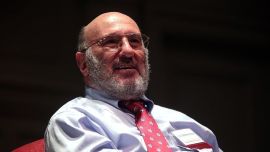The WorldVision Composers Contest is a global competition based in Vienna, Austria, committed to finding the best living classical composers of the world. Hundreds of classical music composers from many countries applied for its world competition, of which 88 were initially shortlisted. After almost six months of competition, involving the creation of three original masterpieces and three auditions from a prestigious global jury, the Argentine composer Rod Schejtman is among the finalists.
It’s an extremely challenging contest where participants are required to demonstrate their ability to write symphonic works that require between 85 and 100 musicians on stage. "There are more than 30 different instruments that the composer must know in depth: how they are played, what are all their possible playing techniques, and how they can be combined with each other," explains Schejtman.
After several rounds and auditions the total number of participants has been reduced to 25. At this moment, there is a single composer representing each country of the world that has reached this final stage. Now, public voting will define the three winners who will have their masterpieces recorded by the «NOVA Orchester Wien» symphony orchestra, in Vienna, Austria.
To listen and support their work, you can vote at:
https://wvcomposers.classic-at-home.com/participants/368
There is time until March 15, when the three winners will be decided by public voting.
"For each stage of the competition, the composers needed to submit an original masterwork created specifically for this contest, following specific musical and instrumental requirements given by the Worldvision Composers Contest. The requirements of each stage included the submission of an audio that simulates a live orchestra and a full orchestral score to be played by live musicians," he explained. In each of the stages, the composers had to pass a demanding audition from a prestigious jury. "Not only are they looking for talented composers, but they are also looking for composers with great artistic potential," the musician acknowledged. With more than 25 years of experience, Rod Schejtman is known as a classical music and music for films composer. His biggest musical influences are the legendary composers Frédéric Chopin and Sergei Rachmaninoff, as well as current film-composers like John Williams and Ennio Morricone.
“The biggest musical challenge of my life”
The complexity of composing a symphony is immeasurable, “it is the greatest musical challenge of my life”, acknowledges Schejtman. "Beethoven composed only nine symphonies throughout his entire life and Brahms took 14 years to compose his very first," explained the composer. In an in-depth interview with PERFIL, Schejtman shares the details of this global competition:
- Tells us about your experience of competing in the first rounds of this worldwide competition?
All rounds were challenging in their own way. In the first one, I created "La Magia di Vivere", a medium-length work for symphony orchestra that requires 85 musicians on stage. The second round was very different: the challenge was to compose “chamber music”. Centuries ago, during the times of the great palaces, kings, and aristocratic societies; the music fulfilled a very important entertainment role and, as there were no recordings, no Spotify, no YouTube, everything was live. Unlike today, an "ordinary" person used to listen to the same work three times in his life, if he was lucky enough to witness them. At the entrance of the great theaters it was usual for there to be a musician who played the main melody of the work, on his portable instrument, for those who did not have the possibility of accessing the show. In the great palaces it was very different. Every wealthy person had a "chamber" in their palace, which was a very large room - although much smaller than an amphitheater - that allowed an "intimate" show, with up to ten musicians on "stage". The audience was not ordinary. It was formed by erudite aristocratic people: everyone played an instrument, most had deep musical knowledge - and they demanded very elaborate compositions. This type of very "academic", intricate, and intimate music, came to be known as "chamber music". The most common were quintets and quartets, that is, four or five instruments that played simultaneously. In chamber music, the virtuosity of the composer stands out in the details of the composition. In my case, for Round 2, I chose to write a string quintet, with the aesthetics of past centuries, titled “Un Raggio di Sole” – a work for two violins, a viola, a cello, and a double bass.
-How did your musical journey begin?
-It all started when I was very young. In my house, there was always music, because this was my father’s passion. However, in the living room of my house there was a piano that was never played, and it caught so much my attention that it was me who asked my parents to find me a piano teacher. Many years later, when I was already a teenager, my interest turned into composition: I needed to understand how the great composers had created their works. Composing my own music was the possibility of being able to transmit my own feelings, sensations, and reach the inner depths of my audience. I started to enjoy composing and performing my own works, because this allowed me a much deeper level of expression than playing works by other composers. Composing for piano is like being able to create beautiful drawings, with defined contours, but in “black and white”. This is why a bigger dream was born in me, which required many years of study and dedication: I decided I wanted to become an orchestrator in addition to being a composer.
-And what was the motivation?
-The symphony orchestra gave me the possibility of imagining millions of different textures, colors, timbres and different sounds for the melodies that I imagined in my head; and to be able to transform my drawings from “black and white” into “full color”. Today, composing for a symphony orchestra is what truly allows me to express myself to the fullest and narrate intimate stories through my music.
-Why did you turn into classical music?
-I ventured into jazz for many years and since I was a child I studied both classical and jazz in as much depth as I could. However, my great love has always been classical music. It was something that caught me from a very young age: Chopin's melodies were always my favorites, the ones that touched my heart and resonated the most with my feelings. My passion towards it grew so big that I let go of the rest of the genres and discovered that classical music, specifically that of the Romantic Classical period, was the one that fulfilled me the most, allowing me to express my feelings, and narrate musical stories in all their potential. Classical music poses an intellectual challenge in addition to the artistic one: it is fascinating to listen to the great works and to see how each composer solved the “same problem”, in a different way. As a classical composer, one seeks the same goal: to see if he can climb that great mountain that others climbed, but by following a different path. Composing a great symphonic work, like the last one I submitted for the final stage of this contest, has a lot of this process. It is both the intellectual challenge of conceptualizing the entire work, as if it were a novel, and devising its characters, the plot, and the ending before even beginning to compose it; at the same time of having the artistic challenge of conveying the desired emotions. In classical music, is where both the intellectual and emotional parts are combined; and I find both challenges. Also, the classical music of the Romantic period, which is my favorite, is very familiar to all of us. Film music has a lot of the aesthetics of this period and thus my music is a mixture of both influences. For this reason, I often like to think of my works as if they were films, which tell a story, but without an image.
The final round
Although a complete symphony is not requested for this competition, Rod Schejtman has decided to make his final submission the seed of what will later become his Symphony No. 1. “Today composing a symphony is extremely difficult, because beyond the challenge itself, there is little information about the procedure and how the great masters did it," he explained. “Centuries ago, secrets were passed from generation to generation through student-teacher relationships; the disciple lived, literally, with the teacher for years, to absorb his knowledge”, highlights the musician.
Rod Schejtman presented his final masterpiece "Luce Nell 'Oscurità", which requires 80 musicians on stage. Passing this stage means being among the three winning finalists who will have their masterpieces recorded by a live orchestra in Vienna, Austria. The first prize also includes an invitation to Vienna, Austria, where the winner will be able to listen his masterpiece performed by the Symphony Nova Orchestrer Wien (NOW), during the final Gala Concert of the WorldVision Music Contest, at the great Vienna Konzerthaus.
"'Luce Nell 'Oscurità', is a profound expression of hope and the importance of persevering in difficult times; and that everything is possible, if you keep trying, without ever giving up, with passion, and persistence", anticipates Schejtman.
"This work is the result of a lot of effort involving many years of study ", detailed Schejtman who excitedly pointed out that from now on "it is the beginning of a new stage as a composer" .
























Comments